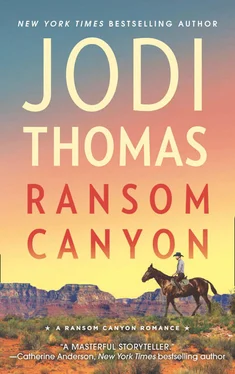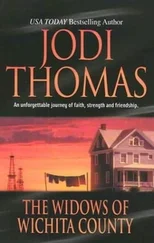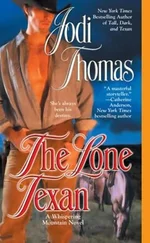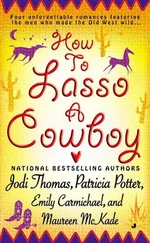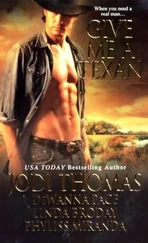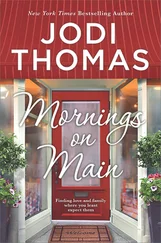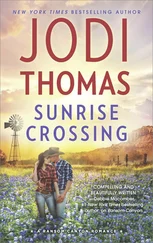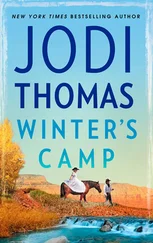Half an hour later he finally slowed as he turned into a farm twenty miles north of Crossroads, Texas. A sign, in need of painting and with a few bullet holes in it, read simply “Lavender Lane.” Even in the rain the air here smelled of lavender. He’d made it to Quinn’s place. One house, one farm, sat alone with nothing near enough to call a neighbor.
Quinn O’Grady’s home always reminded him of a little girl’s fancy dollhouse: brightly painted shutters and gingerbread trim everywhere. Folks sometimes commented on how the house was as fancy as the woman who owned it was plain, but Staten had never thought of her that way. She was shy, had kept to herself even in grade school, but she was her own woman. She’d built a living out of the worthless land her parents had left her.
He might have gone his whole life saying no more than hello to her, but Quinn O’Grady had been his wife’s best friend. Even after he’d married Amalah, she’d still have her “girls’ days” with Quinn.
They’d can peaches in the fall and take courses at the church on quilting and pottery. They’d take off to Dallas for an art show or to Canton for the world’s biggest garage sale. He couldn’t count the times his wife had climbed into Quinn’s old green pickup and simply called out that they were going shopping as if that were all he needed to know. Half the time they didn’t come back with anything but ice-cream-sundae smiles.
Quinn hadn’t talked to him much in those early years, but she’d been a good friend to his wife, and that mattered. Near the end, she’d sat with Amalah in the hospital so he could go home to shower and change clothes. That last month, it seemed she was always near. The two women had been best friends all their lives, and they would be to the end.
Staten didn’t smile as he cut the engine in front of Quinn O’Grady’s house. He never smiled. Not anymore. For years he’d worked hard thinking he’d be passing on the Double K to his son. Now, if Staten died, the ranch would probably be sold at auction to help support his father’s run for the senate or, who knows, the old guy might run for governor next time. Even though Samuel Kirkland was in his sixties, his fourth wife was keeping him young, he claimed. He’d never had much interest in the ranch and hadn’t spent a night on Kirkland soil since Staten had taken over the place.
Quinn caught Staten’s attention as she opened her door and stared out at him. She had a big towel in one hand as she leaned against the door frame and waited for him to climb out of the truck and come inside. She was tall, almost six feet, and ordinary in her simple clothes. He couldn’t imagine Quinn in heels or her hair fixed any way except the long braid she always wore down the center of her back. She’d worn jeans since she started school; only, there had been two braids trailing down her back then.
Funny , Staten thought as he climbed out and tried to outrun the rain, a woman who wants nothing to do with frills or lace lives in a dollhouse.
After he reached the porch and shook like a big dog, she handed him the towel. “When I saw the storm moving in, I figured you’d be coming. Tug off those muddy boots while I dip up some soup for supper. I made taco soup when I saw the clouds rolling in from the north.”
No one ordered any Kirkland around. No one. Only here, in her house, he did what she asked. He might never have another drop of love in him, but he’d still respect Quinn.
His spurs jingled as his boots hit the porch. In his stocking feet he stood only a few inches taller than her, but with his broad shoulders he guessed he probably doubled her in weight. “Any chance the clouds made you think of coconut pie?”
She laughed softly. “It’s in the oven. Be out in a minute.”
They watched the stormy afternoon turn into evening, with lightning putting on a show outside her kitchen window. He liked how he felt comfortable being silent around her. They sometimes talked about Amalah and the funny things that had happened when they were growing up. He felt as if he and Quinn were the leftovers, for the best of them had both died with Amalah.
Only, tonight his thoughts were on his son, and Staten didn’t really want to talk at all. As the sun set, the temperature dropped, and the icy rain turned to a dusting of soft mushy snow while they ate in silence.
When he reached for his dishes and started to stand, she stopped him with a touch on his damp sleeve. “I’ll do that,” she said. “Finish your coffee.”
He sat quiet and still for a few minutes, thinking how this place of hers seemed to slow his heart and make it easier to breathe. He finally left the table and silently moved to stand behind her as she worked at the sink. With rough hands scabbed over in places where the reins had cut, he began to untie her braid.
“I did this once when we were in third grade. I remember you didn’t say a word, but Amalah called me an idiot after school.”
Quinn nodded but didn’t speak. Shared memories settled comfortably between them.
He liked the way Quinn’s sunshine hair felt, even now. It was thick and hung down straight except for the slight waves left by the braid.
She turned and frowned up at him as she took his hand. Without asking questions she pulled his injured palm under running water and then patted it dry. When she rubbed lotion over his hand, it felt more like a caress than doctoring.
He was so close behind her their bodies brushed as she worked. Leaning down, he tickled her neck with a light kiss. “Play for me tonight,” he whispered.
Turning toward the old piano across the open living area, she shook her head. “I can’t.”
He didn’t question or try to change her mind. He never did. Sometimes, she’d play for him, other times something deep inside her wouldn’t let her.
Without a word, she tugged him to the only bedroom, turning off lights as they moved through the house.
For a while he stood at the doorway, watching her remove her plain work clothes: worn jeans, a faded plaid shirt that probably belonged to her father years ago and a T-shirt that hugged her slender frame. As piece by piece fell, pale white skin glowed in the low light of her nightstand.
When he didn’t move, she turned toward him. Her breasts were small, her body lean, her tummy flat from never bearing a child. All she wore was a pair of red panties.
“Finish undressing me,” she whispered, then waited.
He walked toward her, knowing that he wouldn’t have moved if she hadn’t invited him. Maybe it was just a game they played, or maybe they’d silently agreed on unwritten rules when they’d begun. He couldn’t remember.
Pulling her against him, he just held her for a long time. Somehow on that worst night of his life five years ago, he’d knocked at her door. He’d been muddy, grieving and lost to himself.
She hadn’t said a word. She’d just taken his hand. He’d let her pull off his muddy clothes and clean him up while he tried to think of a way to stop breathing and die. She’d tucked him into her bed and then climbed in with him, holding him until he finally fell asleep. He hadn’t said a word, either, guessing that she’d heard the news reports of the crash. Knowing by the sorrow in her light blue eyes that she shared his grief.
A thousand feelings had careened through his mind that night, all dark, but she’d held on to him. He remembered thinking that if she had tried to comfort him with words, even a few, he would have shattered into a million pieces.
Just before dawn, he remembered waking and turning to her. She’d welcomed him, not as a lover, but as a friend silently letting him know it was all right to touch her. All right to hold on.
In the five years since, they’d had long talks, sometimes when he sought her out. They’d had stormy nights when they didn’t talk at all. He always made love to her with a gentle touch, never hurried, always with more caring and less passion than he would have liked. Somehow, it felt right that way.
Читать дальше
